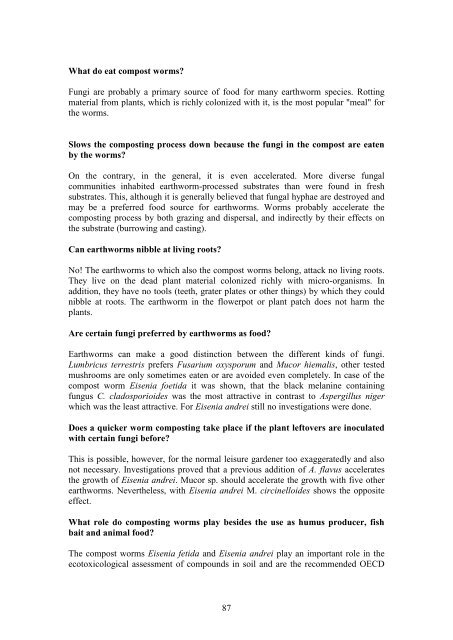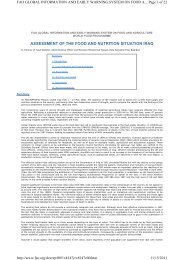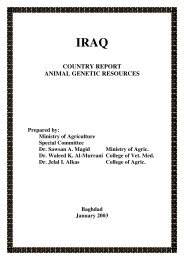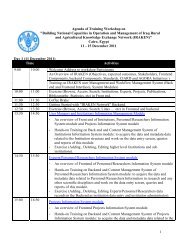Vermiculture in Egypt: - FAO - Regional Office for the Near East and
Vermiculture in Egypt: - FAO - Regional Office for the Near East and
Vermiculture in Egypt: - FAO - Regional Office for the Near East and
You also want an ePaper? Increase the reach of your titles
YUMPU automatically turns print PDFs into web optimized ePapers that Google loves.
What do eat compost worms?<br />
Fungi are probably a primary source of food <strong>for</strong> many earthworm species. Rott<strong>in</strong>g<br />
material from plants, which is richly colonized with it, is <strong>the</strong> most popular "meal" <strong>for</strong><br />
<strong>the</strong> worms.<br />
Slows <strong>the</strong> compost<strong>in</strong>g process down because <strong>the</strong> fungi <strong>in</strong> <strong>the</strong> compost are eaten<br />
by <strong>the</strong> worms?<br />
On <strong>the</strong> contrary, <strong>in</strong> <strong>the</strong> general, it is even accelerated. More diverse fungal<br />
communities <strong>in</strong>habited earthworm-processed substrates than were found <strong>in</strong> fresh<br />
substrates. This, although it is generally believed that fungal hyphae are destroyed <strong>and</strong><br />
may be a preferred food source <strong>for</strong> earthworms. Worms probably accelerate <strong>the</strong><br />
compost<strong>in</strong>g process by both graz<strong>in</strong>g <strong>and</strong> dispersal, <strong>and</strong> <strong>in</strong>directly by <strong>the</strong>ir effects on<br />
<strong>the</strong> substrate (burrow<strong>in</strong>g <strong>and</strong> cast<strong>in</strong>g).<br />
Can earthworms nibble at liv<strong>in</strong>g roots?<br />
No! The earthworms to which also <strong>the</strong> compost worms belong, attack no liv<strong>in</strong>g roots.<br />
They live on <strong>the</strong> dead plant material colonized richly with micro-organisms. In<br />
addition, <strong>the</strong>y have no tools (teeth, grater plates or o<strong>the</strong>r th<strong>in</strong>gs) by which <strong>the</strong>y could<br />
nibble at roots. The earthworm <strong>in</strong> <strong>the</strong> flowerpot or plant patch does not harm <strong>the</strong><br />
plants.<br />
Are certa<strong>in</strong> fungi preferred by earthworms as food?<br />
Earthworms can make a good dist<strong>in</strong>ction between <strong>the</strong> different k<strong>in</strong>ds of fungi.<br />
Lumbricus terrestris prefers Fusarium oxysporum <strong>and</strong> Mucor hiemalis, o<strong>the</strong>r tested<br />
mushrooms are only sometimes eaten or are avoided even completely. In case of <strong>the</strong><br />
compost worm Eisenia foetida it was shown, that <strong>the</strong> black melan<strong>in</strong>e conta<strong>in</strong><strong>in</strong>g<br />
fungus C. cladosporioides was <strong>the</strong> most attractive <strong>in</strong> contrast to Aspergillus niger<br />
which was <strong>the</strong> least attractive. For Eisenia <strong>and</strong>rei still no <strong>in</strong>vestigations were done.<br />
Does a quicker worm compost<strong>in</strong>g take place if <strong>the</strong> plant leftovers are <strong>in</strong>oculated<br />
with certa<strong>in</strong> fungi be<strong>for</strong>e?<br />
This is possible, however, <strong>for</strong> <strong>the</strong> normal leisure gardener too exaggeratedly <strong>and</strong> also<br />
not necessary. Investigations proved that a previous addition of A. flavus accelerates<br />
<strong>the</strong> growth of Eisenia <strong>and</strong>rei. Mucor sp. should accelerate <strong>the</strong> growth with five o<strong>the</strong>r<br />
earthworms. Never<strong>the</strong>less, with Eisenia <strong>and</strong>rei M. circ<strong>in</strong>elloides shows <strong>the</strong> opposite<br />
effect.<br />
What role do compost<strong>in</strong>g worms play besides <strong>the</strong> use as humus producer, fish<br />
bait <strong>and</strong> animal food?<br />
The compost worms Eisenia fetida <strong>and</strong> Eisenia <strong>and</strong>rei play an important role <strong>in</strong> <strong>the</strong><br />
ecotoxicological assessment of compounds <strong>in</strong> soil <strong>and</strong> are <strong>the</strong> recommended OECD<br />
87





